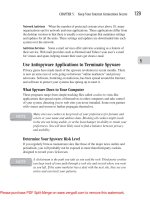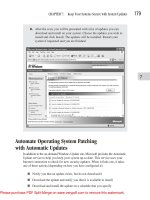Tài liệu What to do after a death in England or Wales pptx
Bạn đang xem bản rút gọn của tài liệu. Xem và tải ngay bản đầy đủ của tài liệu tại đây (228.16 KB, 74 trang )
What to do after
a death
in England or Wales
Part of the Department for Work and Pensions
Introduction
When someone close to you dies, there are
many decisions and arrangements you’ll
have to make, often at a time of personal
distress.
This leaflet gives you help and guidance
about what to do when someone dies. For
example, it tells you how to:
• get a medical certificate which shows
the cause of death
• register the death
• arrange the funeral, and
• decide what to do with the person’s
property and belongings.
It also tells you about the financial help you
may be able to get and lists organisations
who can give you support and comfort.
This leaflet tells you about what to do after
a death in England or Wales. Some of the
information is different for deaths in
Scotland. Go to the website
www.scotland.gov.uk or visit a Jobcentre in
Scotland to see a leaflet about this
produced by the Scottish Government.
What to do after a death
3
Contents
What to do first 5
If someone dies in hospital 5
If someone dies elsewhere 5
If the cause of death is not clear 6
If the organs and/or body are to be
donated 12
If you want to move a body out
of England or Wales 14
How to register a death 15
What happens at the registrar's office 16
The death certificate 18
Registering the death of a stillborn
baby 18
Arranging the funeral 21
Arranging the funeral without a funeral
director 22
Choosing a funeral director 22
Deciding about cremation or burial 24
If the person died outside
England or Wales 27
Registering someone's death 27
Funerals abroad 28
Bringing a body back to
England or Wales 28
Paying for the funeral 31
If someone has arranged to pay
for their own funeral 31
Employer's pension schemes or
personal pensions 32
Other pensions and payments 34
4
Funeral Payments from the
Social Fund 35
When a war pensioner dies 37
Other help 38
Dealing with someone's estate and
belongings 39
The will 39
Jointly-owned property 40
Getting permission to deal with
the estate 40
What does the executor or
administrator need to do? 42
Distributing the estate and dealing
with claims on the estate 48
Summary of the intestacy rules 49
Who can make a claim on an estate? 51
Help and support for you 54
Bereavement benefits 55
Entitlements that may have changed 58
Payments for bereavement in special
circumstances 61
Help to bring up a baby or child 63
Maternity benefits 63
Child Benefit 63
Guardian's Allowance 63
Help if you do not have enough to
live on or are on a low income 65
Tax credits 65
Income Support 66
Jobseeker's Allowance 67
Pension Credit 67
Housing Benefit 68
Council Tax Benefit 68
Help with health costs 69
What to do after a death
5
What to do first
If someone dies in hospital
If someone dies in hospital, the hospital
staff will contact the person named by that
person as their ‘next of kin’.
The hospital will keep the body in the
mortuary until the executor or someone
acting on their behalf arranges for it to be
taken away. Most funeral directors have a
chapel of rest where the body will be held
until the funeral.
If someone dies elsewhere
If you expected the person’s death
If you expected the person’s death, you
should contact the doctor who cared for
them during their illness. If the doctor can
confirm the cause of death, they will give
you:
• a medical certificate that shows the
cause of death (this is free of charge and
will be in an envelope addressed to the
registrar), and
• a formal notice that says that the doctor
has signed the medical certificate (this
tells you how to get the death
registered).
If you did not expect the person’s death
If the person’s death is sudden or
unexpected or you discover a body, you
should contact the person’s:
An ‘executor’ is the
person named in a will
who should take charge
of doing everything the
will asks
6
• family doctor (if you know who it is), or
• nearest relative.
You must also contact the police. They can
help you find the people listed above, if
necessary.
If the cause of death is not clear
If the cause of death is not clear, the doctor
or other people who helped to look after
the person must report it to the coroner.
The coroner may decide that there needs
to be a post-mortem and an inquest.
Coroners
The coroner is a lawyer or doctor
responsible for investigating a death when:
• the cause is sudden and unknown
• it was violent, unnatural or happened
under suspicious circumstances, or
• it happened in prison or in police
custody.
In these cases, the coroner may be the
only person who can confirm the cause of
death. The doctor will write on the formal
notice that they have referred the death to
the coroner.
If you want advice or information about a
death which you have reported to the
coroner, contact the coroner’s office. You
can get the address from the police station,
your local library or the hospital where the
person died.
7
What to do after a death
Post-mortems
A post-mortem is a medical examination of
the body, which can find out more about
the cause of death. It should not delay
when you can have the funeral.
The coroner may arrange for a post-
mortem. If you’re a relative of the person
who has died, they do not need your
permission to do this, but you are entitled
to have a doctor represent you at the post-
mortem. If this is the case, the coroner will
tell you when and where the post-mortem
will be.
If the person dies in hospital, you may ask
the coroner to arrange for the post-mortem
to be carried out by a pathologist other
than one employed at or connected to the
hospital the person died in.
The coroner will usually pay to remove the
person’s body from where they died to the
mortuary for the post-mortem. The coroner
must ask your permission (if you are the
person’s next of kin) if any organs or tissue
need to be kept once the post-mortem has
been carried out.
The coroner will choose a funeral director
to take the person’s body from where they
died to the hospital mortuary. You can then
choose your own funeral director to carry
out the funeral once the coroner has
finished the post-mortem.
8
If the post-mortem shows that a person
has died due to natural causes, the
coroner may issue a notice known as ‘Pink
Form B’ (form 100B). This form shows the
cause of death so that the death can be
registered.
If the body is going to be cremated, the
coroner will give you the certificate for
cremation which allows you to arrange for
the body to be cremated (see page 24).
Inquests
An inquest is a fact finding inquiry into the
medical cause and circumstances of a
death. It is held in public, sometimes with a
jury. It is up to the coroner to decide how
to organise the inquiry in a way which is
best for the public and the relatives of the
person who died.
The coroner will hold an inquest if:
• the death was of unknown cause,
violent or not natural
• the death was caused by a disease in
the workplace, or
• the person died in prison.
Coroners hold inquests in these
circumstances even if the person died
outside England or Wales, if the body is
returned here. If someone’s body has been
destroyed by fire or is lying in a place from
which it cannot be recovered, a coroner
can hold an inquest by order of the
Secretary of State.
What to do after a death
9
If an inquest is held, the coroner must tell
the following people (if their name and
address is known to the coroner):
• the husband, wife or civil partner of the
person who died
• the nearest relative (if this is not the
person’s husband, wife or civil partner),
and
• the person’s personal representative or
executor (if they are not any of the
above).
You can go to an inquest and ask the
witnesses questions, but only about the
medical cause and circumstances of the
person’s death, if you are:
• a parent, child, husband, wife or partner,
or personal representative of the person
who died
• a beneficiary under the insurance of the
person who died
• the insurer who issued the policy;
• a person whose act or omission may
have caused or contributed to the death
• a person appointed by the trade union
of the person who died if they may have
died from an industrial injury or disease
• a person appointed by an enforcing
authority or government department, or
• the chief police officer.
10
The coroner may decide it is right to allow
other people not listed here to ask
questions.
It is not necessary to be legally represented
at an inquest. The inquest is not a trial so
there is no prosecution or defence.
Witnesses are not expected to present
legal arguments and an inquest cannot
blame anyone for the death. The coroner
ensures that the process is impartial and he
or she ensures that the process is
thorough, and is expected to assist families
and ensure that their questions are
answered.
If the inquest takes some time, ask the
coroner to give you an ‘interim certificate of
the fact of death’ or a letter confirming the
person’s death. You can use this certificate
or letter for benefits and National Insurance
purposes. Financial institutions should
usually accept this certificate as evidence
of the death. The coroner may give you an
‘order for burial’ or a ‘certificate for
cremation’ so that you can arrange the
funeral, as long as the body is not needed
for further examination.
The coroner will also send a ‘certificate
after inquest’ to the registrar, which will
give the cause of death. This means that
the registrar can register the death.
Go online at www.direct.gov.uk to see
more information about the inquest system
and what the coroner is responsible for.
11
What to do after a death
Summary of forms and certificates
Some of the forms and certificates you may be given by doctors and
coroners are listed below. The list explains when and where you get
each form.
When someone
has died
In all cases
The death is not
referred to a coroner
A baby is stillborn
The death is referred
to a coroner, but
there is no inquest
There is an inquest
and the body is to
be buried
There is a post-
mortem or an
inquest and the
body is to be
cremated
The body is to be
moved out of
England or Wales
You will usually get
the following
Formal notice
Medical certificate
Medical certificate of
stillbirth
Notification by the
coroner (pink form
100A or 100B)
Order for burial
(form 101)
Coroner’s certificate
for cremation
Removal notice
(form 104)
You will get this
from the following
Doctor
Doctor
Doctor or midwife
Coroner (the coroner
usually sends this
direct to the
registrar, but you
may be asked to
take it to the
registrar yourself)
Coroner
Coroner
Coroner
12
If the organs and/or body are to be
donated
It is sometimes possible to use organs and
body tissues from someone who has died,
which can help others to live.
Whether or not organs can be transplanted
depends on how and where the person
died. The donation of internal organs (such
as the liver, kidneys, heart or lungs) may be
possible if the person died in hospital while
on a ventilator, but not if they died at home
or elsewhere. Wherever they died, it may
be possible to donate corneas, heart valves
and skin and bone.
If the cause of death is suspicious, sudden
or unexpected and has been referred to
the coroner, the coroner must agree to the
removal of the organ, since the removal
could affect some important evidence.
Decisions can usually be made very
quickly.
If the person who died carried a donor card
or was listed on the NHS Organ Donor
Register and it is possible to transplant an
organ, the appropriate qualifying person
(see page 13) will be contacted to ask
whether or not they agree to donation.
What to do after a death
13
Where the person who died did not
indicate their consent (or refusal) to donate
their organs and, in the case of an adult, a
nominated representative has not been
appointed, someone close to them can
give consent to the removal, storage and
use of organs and tissues for
transplantation.
The Human Tissue Act 2004 sets out the
order in which those close to the deceased
person should be contacted for the
purposes of obtaining consent for the use
of organs or body tissues. In order of
priority this is:
• Partner
• Parent or child
• Brother or sister
• Grandparent or grandchild
• Niece or nephew
• Stepfather or stepmother
• Half brother or half sister
• Friend of long standing
If you have not already been asked about
organ and/or tissue donation and want to
find out whether or not it is possible, speak
to staff at the hospital and visit the UK
Transplant website at
www.uktransplant.org.uk
Partner
We will treat you as a
couple if you live with
your husband, wife or
civil partner, or if you live
with someone as if they
were your husband,
wife or civil partner. We
call this other person
your partner.
14
Donating a body for medical education,
training or research
People who donate their bodies make a
vital contribution to training by medical
schools. Those who wish to donate their
body must have made their wishes known
in writing before they died, and let their
next of kin know.
The Human Tissue Authority regulates this
area, and if you need to know more about
how to donate a body, visit www.hta.gov.uk
If you want to move a body out of
England or Wales
If you want to move the body out of
England or Wales (for example, so that you
can have the funeral abroad), you must get
the coroner’s permission. You need to get
this at least 4 days before you want the
body to be moved. Sometimes, the
coroner may be able to give their
permission sooner.
After the coroner has finished their
inquiries, they will give you a ‘removal
notice’.
This procedure applies in all cases where
the body is to be moved out of England or
Wales, not just when you report a death to
the coroner.
What to do after a death
15
How to register a death
The death must be registered with the
registrar of births and deaths. You can find
the address in the phone book.
If the death has not been referred to the
coroner, you should tell the registrar about
it as soon as possible. The death must be
registered within 5 days (unless the
registrar says this period may be
extended).
If the death has been referred to the
coroner, it can’t be registered until the
registrar has received the coroner’s
permission to do so (see page 10).
You can give any registrar in England and
Wales the information to register a death.
You will need to go to the registrar’s office,
to tell them formally about the person’s
death.
Check when the registrar will be there and
if only you need to go along. It may be that
someone else needs to give the registrar
some information to register the death.
If the death took place in a different area
from the registrar you choose, they will
send these details to the registrar who
covers that area to register the death. This
may cause a delay in arranging the funeral.
16
If the person died on a ship or plane, check
which country you need to register their
death in. Usually, this is the country that
the ship or plane is registered in.
What happens at the registrar’s office
When you go to the registrar you should
take:
• the medical certificate which shows the
cause of death
• the person’s medical card, if possible,
and
• the person’s birth and marriage or civil
partnership certificates, if these are
available.
You should tell the registrar:
• the date and place the person died
• the person’s usual address (their only or
main home)
• the person’s first names and surname
(and maiden name, if this applies)
• the person’s date and place of birth (the
town and county if they were born in the
UK, and the country if they were born
abroad)
• the person’s occupation and the name
and occupation of their husband, wife or
civil partner
• if the person was getting a pension or
benefit from the Government, and
What to do after a death
17
• the date of birth of their surviving
husband, wife or civil partner (if the
person was married or in a civil
partnership).
The registrar who registers the death will
give you the following.
• A certificate for burial or cremation
(known as the ‘green form’), unless the
coroner has given you an order for burial
(form 101), or a certificate for cremation.
These give permission for the body to
be buried or to apply for the body to be
cremated. You should take this to the
funeral director so that the funeral can
be held.
• A certificate of registration of death (form
BD8). This is for benefit claim purposes
only. You should read the information on
the back of the certificate. If any of it
applies, fill in the certificate and contact
Jobcentre Plus or The Pension Service.
• Leaflets about bereavement benefits and
income tax for surviving husbands,
wives or civil partners, where
appropriate.
If you register the death away from the area
where the death took place, the registrar
will send this information to you.
18
The death certificate
The death certificate is a certified copy of
what is written in the death register. The
registrar can let you have a death certificate
if you want one, but you will have to pay a
fee.
You may need a death certificate for the will
(see page 39), and for any pension claims,
insurance policies, savings bank certificates
and premium bonds.
You may want to ask for more than one
copy of the death certificate straight away,
as the price increases if you need one later
on. The registrar may not be able to give
you all the copies straight away and may
ask you to call back or ask you to pay an
amount towards postage so that they can
send them to you.
Registering the death of a stillborn baby
If a baby is stillborn (born dead after the
24th week of pregnancy) you will be given
a medical certificate of stillbirth signed by
the midwife or doctor, which you should
give to the registrar. If there wasn’t a doctor
or midwife there, and no doctor or midwife
has examined the body, you must sign a
form (form 35) which the registrar will give
you.
The registrar will give you a certificate for
burial or cremation and a certificate of
registration of stillbirth.
What to do after a death
19
You can ask to have a first name for a
stillborn baby when you register the death.
The registrar will write the baby’s name on
these certificates if the name is recorded in
the register. It is also possible to get
certified copies of what is written in the
death register.
Maternity benefits
If your baby was stillborn after 24 weeks of
pregnancy, you may still be entitled to
Statutory Maternity Pay or Maternity
Allowance. There is a leaflet from Jobcentre
Plus which gives you more information
about this.
You can give any registrar in England or
Wales the information to register a stillbirth.
The procedure to register a stillbirth is
similar to the procedure for registering a
death (see page 15).
To find out more about arranging a funeral
for a stillborn baby, see page 23.
20
Summary of forms and certificates
Below is a list of some of the forms and certificates the registrar will
give you when you register a death. The list explains when and
where you get each form.
When you register a death
If no coroner has issued a
certificate for cremation or a
burial order
If Jobcentre Plus or The
Pension Service needs to know
about the death
If you need evidence of the
death to get probate, pensions
claims, insurance policies,
savings certificates or premium
bonds
If a baby is stillborn
If a baby is stillborn and you
want a burial or cremation
You will usually get the
following
Certificate for burial or
cremation (the green form)
Certificate of registration of
death (form BD8)
Death certificate
Registration of stillbirth
Certificate for burial or
cremation (the white form)
What to do after a death
21
Arranging the funeral
Do not make final funeral arrangements
until you are sure that you do not have to
report the death to the coroner, as this may
affect the date when the funeral can be
held.
Find out if there is a will, as this may give
details of what the person wanted for their
funeral arrangements (see page 39).
If you arrange for a funeral, you are
responsible for paying the bill, so first
check where the money will come from
and if there will be enough to cover all the
costs.
There are some laws about what to do
after someone has died. Their death needs
to be registered and the body needs to be
properly taken care of, by either burial or
cremation.
If you need to arrange a burial or funeral
service in line with a particular religion, you
can get advice from a minister of that
religion or the religious organisation that the
person who died belonged to.
22
Arranging the funeral without a funeral
director
Many people choose to use a professional
funeral director to organise a funeral. They
do this partly because it is easier, at what is
generally a stressful time.
It is possible for you to organise a funeral
without the help of a funeral director, but
you should contact the cemeteries and
crematorium department of your local
council for advice.
Choosing a funeral director
Friends, family, clergy or your doctor may
be able to suggest a local company with a
good reputation. If not, most local firms are
listed in the Yellow Pages. Remember, their
charges can vary considerably. You may
want to contact or visit more than one firm.
Most funeral directors choose to join one of
the 2 trade associations below. Funeral
directors do not have to be in a trade
association, so you may want to check this
before choosing one.
What to do after a death
23
National Association of Funeral
Directors
Phone: 0845 230 1343
Website: www.nafd.org.uk
National Society of Allied & Independent
Funeral Directors
Phone: 0845 230 6777
Website: www.saif.org.uk
Both organisations have codes of practice.
Funeral directors who are members have to
provide you with a price list when you ask,
and they will not increase any costs they
give you without your permission.
The funeral director will need the certificate
for burial or cremation (the green form) or
an order for burial, or a certificate for
cremation which gives permission for a
burial or to apply for a cremation (see page
20).
Funeral for a stillborn baby
The hospital may offer to arrange a burial
or cremation, free of charge, for a stillborn
baby, whether they were born in hospital or
at home. You should discuss the funeral
arrangements with the hospital staff or
midwife.
If you accept the offer the baby will be
cremated or buried after a simple
ceremony, or you can arrange the funeral
yourself.
For information on call charges, see page 70.
24
Deciding about cremation or burial
Check the will to see if the person who has
died has given any instructions for their
funeral. It is generally up to the executor or
next of kin to decide whether to have a
cremation or burial. The executor does not
have to follow the instructions about the
funeral left in the will.
The funeral director will help you to decide
where the body should stay until the
funeral, and when and where the funeral
should take place.
If there is going to be a service or
ceremony, you should contact the
appropriate person for the religion or belief
of the person who has died. If you are not
sure, the funeral director should be able to
help you.
Cremation
No one can be cremated until the cause of
death is definitely known. The crematorium
(or funeral director) usually requires:
• an application form signed by the next of
kin or executor, and
• 2 cremation certificates (the first signed
by the treating doctor and another
signed by a doctor not involved with the
treatment of the person who has died),
or
• a cremation form signed by the coroner.
What to do after a death
25
You have to pay for the cremation
certificates signed by the 2 doctors. If the
death is referred to the coroner, you do not
need these 2 certificates. Instead, the
coroner will give you a certificate for
cremation which is free.
If the crematorium is satisfied that the
cause of death has been confirmed, and
that all the forms have been completed
correctly, the ‘medical referee’ will authorise
cremation by signing a form. The medical
referee has the power to refuse the
cremation and make further enquiries, but
must give a reason for doing so.
If the person died outside England or
Wales, see page 27.
It is important to make it clear to the funeral
director or crematorium staff what you
want to be done with the ashes. If this is
not clear, they will need to contact you to
discuss what they should do.
You can scatter someone’s ashes in a
garden of remembrance or their favourite
place, bury them in a churchyard or
cemetery, or keep them.
In the case of babies and very young
children, there may be no ashes after a
cremation. At some crematoriums you can
arrange to have a memorial plaque which
you may have to pay for.
A ‘medical referee’ is
appointed by the
Secretary of State to
authorise all cremations
in a crematorium.









